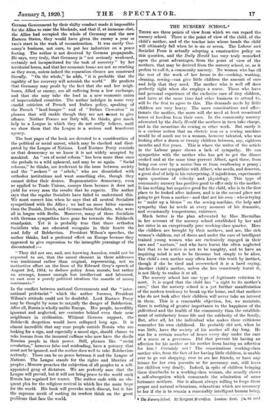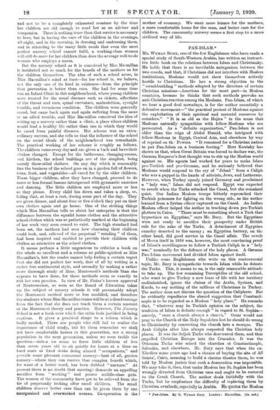THE NURSERY SCHOOL.*
THERE are three pointi of view from which we can regard the nursery schooL There is the point of view of the child, of the child's mother, and of the teacher into whose hands the child will ultimately fall when he is six or seven. The Labour and Socialist Press is actually adopting a constructive policy on this question, and the Daily Herald has very truly remarked upon the great advantages, from the point of view of the mothers, that may be derived from the nursery school, or, as it prefers to call it, a community nursery. No woman who has all the rest of the work of her house to do—cooking, washing, cleaning, sewing--can give little children the amount of care and help that they need. The mother who is well off does perfectly right when she employs a nurse. Those who have had personal experience of the exclusive care of tiny children, and have at the same time had other business to attend to, will be the first to agree to this. The demands made by little children are very heavy. The more conscientious and affec- tionate the mother, the more will she need at least occasional hours of freedom from their care. In the community nursery advocated by the Daily Herald the mothers in turn take charge, and in the meantime do sewing or other work. But surely it is a curious notion that an electric iron or a sewing machine would be of much use to a woman, however talented, who was looking after a dozen or twenty children between, say, eighteen months and five years. This is where the writer of the article in the Labour paper shows a lack of sympathy. He can sympathize with the mother who has got to get the dinner cooked and at the same time prevent Albert, aged three, from being run over by a motor-'bus or from swallowing a penny ; but he does not sympathize with Albert, who needs, and deserves, a great deal of help in his enterprising, if injudicious, experiments upon questions of velocity and physiology. This type of community nursery has positive good to offer only to the mother. It has nothing but negative good for the child, who is in the first place to be looked after indoors, and is in the second place not going to get from a mother—and that not his own—who is trying to " make up a blouse " on the sewing-machine, the help and sympathy that he needs at every moment of his dramatic, and occasionally tempestuous, existence.
Much better is the plan advocated by Miss Macmillan in her account of the nursery school established by her and her sister in an exceptionally poor working-class quarter. Here the children are brought by their mothers, and are, like rich women's children, out of doors and under the care of intelligent trained young women who are exclusively engaged in their care and " nurture," and who have learnt the often neglected fact that to be active is not to be naughty, and to have an inquiring mind is not to be tiresome but simply to be alive. The child's own mother may often know this truth by instinct, though if she be tired and overworked it is a hard saying. Another child's mother, unless she has consciously learnt it, is not likely to realize it at all.
The nursery school has one type of legitimate criticism to meet. It is urged that the child has " a right to its mother's care," that the nursery school is a yet further manifestation of the modern tendency to break up the home, and that mothers who do not look after their children will never take an interest in them. This is a reasonable objection, for, we maintain, there is nothing of greater importance to the happiness of the individual and the health of the community than the establish- ment of satisfactory home life and the solidarity of the family. But, after all, let the individual who makes these criticisms remember his own childhood. He probably did not, when he was little, have the society of his mother all day long. He was for a certain number of hours every day under the care of a nurse or a governess. Did that prevent his having an affection for his mother or his mother from having an affection for him ? Certainly not ! The conscientious working-class mother who, from the fact of her having little children, is unable ever to go out shopping, ever to see her friends, or have any leisure for her own pursuits or for necessary rest, still loves her children very dearly. Indeed, in spite of children bringing these drawbacks to a working-class woman, she usually shows a self-abnegation which commands the admiration of more fortunate mothers. She is almost always willing to forgo these proper and natural relaxations, relaxations which are necessary to her if she is to remain a reasonably intelligent human being, ! TA. Nursey School. By 3Iargaret MPemillan, London: Dent, [Vs. 64. adj. and not to be a completely exhausted creature by the time her children, are old enough ta need her as an adviser and companion. There is. nothing, truer than that serviceienecesaary to love, but in. having the care of the children in the -evenings, all, night, and in the morning, in dressing and undressing them, and in attending to the many little needs that even the most perfect nursery school cannot fulfil, a working-class. woman will still do more for her children, than does the average well-to-do woman who employs a nurse.
But the nursery school as it is conceived by Miss. Macmillan is instituted not so much for the benefit of the mothers as for the children. themselves. The idea of such a school arose, in Miss Macmillan's mind at least—for her school is, we believe, not the only one of its kind in existence—from the principle that prevention is better than. cure. She had for some, time run an Infant Clinic in this neighbourhood, where young children were treated for the usual diseases such as rickets, affections of the throat and ears, spinal curvature,. malnutrition, eyesight trouble, and verminous condition. The children were generally cured, but came back again and again suffering from the same or an allied trouble, and Miss Macmillan conceived the idea of setting up a nursery rather than a clinic, a place where, children would lead a healthy life rather than one in, which they would be cured. from painful diseases. Her scheme was an extra- ordinary success,, and she tells us that the influence of the school on the social ideals of the neighbourhood was remarkable. The practical working of her scheme is roughly as follows. The children come every day and are given. a bath and have their clothes changed. Except for the bathrooms, changing-rooms, and, kitchen, the school buildings are of the simplest, being merely three-sided shelters. On• any day which is reasonably fun, the business of the school goes on in a garden full of flowers, trees, fruit, and vegetables—all cared for by the older children. These, bigger children, after they have changed,. proceed. to do more or les&formal lessons interspersed with gymnastic. exercises and dancing. The little children are employed more or less as they please. Every child lies: down, and, takes a sleep, or, failing that,, at least a rest, during some part of the day. They are given dinner, and about four or five o'clock they put on their own clothes again and go home. One of the., striking things which• Miss Macmillan, tells us about her enterprise. is. that the difference between the squalid. home clothes and the attractive school,elothes which was so pathetically marked at the beginning of her work very soon ceased, to exist. The high, standard had been set, the mothers. had seen how charming their children could- look, and, relieved of the perpetual " minding " of them, had been inspired and enabled to provide their children with clothes. as attractive as- the school clothes.
It seems perhaps. a little ungracious to criticize a book on the whole so, excellent and & scheme so public-spirited as Mies Macmillan's, but the reader cannot help feeling a certain regret that she did not perfect her work, first of all by writing in a rather less sentimental style, and secondly by making a rather more thorough. study of Pi/rne. Montessori's methods than she appears to have done, for these methods seem so exactly to suit her own practice. In view of Mr. Fisher's known approval of Montessorism, as soon as the Board of Education takes up the subject of nursery schools it will presumably adopt the Montessori method more or less modified, and therefore the students whom Miss Macmillan trains will be at adisadvantage from the fact that she does not teach them a. certain amount of the Montessori theory and practice. However, The Nursery School is not a book over which the critic feels justified in being captious. It gives a practical shape to a reform which is badly needed. There are people who still fail to realize the importance of child study, but let them remember we shall not have comfortable homes in this generation, nor a strong population in the next generation, unless we soon tackle the question—unless we cease to force little children of less than seven years old to sit quietly for hours at a time on hard seats at fixed desks doing absurd " occupations," and provide some pleasant communal nursery—best of all, garden nursery—where they can receive that complex benefit which, for want of a better word, has been dubbed " nurture." At present there is no doubt that marriage demands an appalling sacrifice from " working " and poorer middle-class girls. The women of the community have got to be relieved from the tie of perpetually looking after small children. The small children deserve better care than can be given them by one unorganized and overworked woman, Co-operation is the
mother of economy. We want more leisure• for the mothers, a more comfortable home for the man, and better care for the children. The community nursery seems• a• first step•to a more civilized way of life.











































 Previous page
Previous page